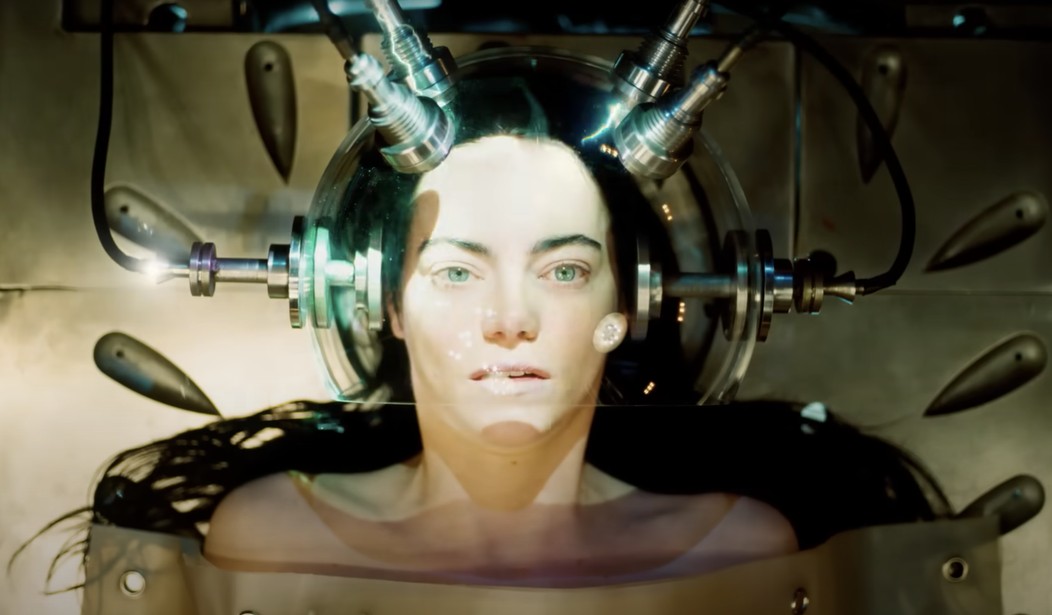Julie Hintsinger, executive director of the Telluride Film Festival, told an audience prior to the showing of Yorgos Lanthimos inventive and despicable sci-fi comedy “Poor Things,” “Sex is back.”
An inane observation, to be sure. Ever since 2013’s “Blue is the Warmest Color,” which graphically depicted lesbian sex, mainstream art houses have given their stamp of approval to well-written, beautifully shot, and wonderfully acted pornography. And before then? I challenge anyone to point to a time in world history when sex didn’t sell.
You can put lipstick on a pig, but in the end, what you have is an animal that rolls around in the filth and mud, staining it and everyone around it. And despite Hollywood’s attempts to “normalize” porn, it can’t be done.
Porn is a $5 billion industry, so why shouldn’t Hollywood tap into that huge market by making films with graphic depictions of sexual acts?
The premise of “Poor Things” is actually very clever. A mad Victorian scientist (William Dafoe) resurrects a pretty woman who committed suicide. Bella (Emma Stone) goes on a bunch of adventures with a very worldly and depraved lawyer (Mark Ruffalo).
The subtext of the story is that childlike Bella is being sexually manipulated by the adult lawyer. Bella’s “awakening” is graphically and apparently painfully realized. Emma Stone appreciated Bella’s total lack of shame about sex and nakedness.
“Even though Bella has obviously been through trauma in her life, it just isn’t there for her now. She was the most joyous character in the world to play, because she has no shame about anything. She’s new, you know? I’ve never had to build a character before that didn’t have things that had happened to them or had been put on them by society throughout their lives. It was an extremely freeing experience to be her,” Stone told Vogue.
Indeed, Vogue swooned over the “awakening” of Bella, making it a feminist political statement.
Watching Bella’s mental age catch up to her physical development is eerie, to be sure—for an explanation of how all of this works, see Scottish writer Alasdair Gray’s 1992 novel of the same name, adapted for this film by Tony McNamara—but it’s also strangely empowering. Of all the pleasures that the world has in store, sex is perhaps her most important discovery, and as Bella pursues it with verve, she emerges as a rare female protagonist who simply has no regard for societal judgment. When a former lover, played by Mark Ruffalo, tries to shame her for working at a brothel in Paris, she shoots back: “We are our own means of production.” (As it happens, she and a colleague are on their way to a meeting for young socialists.)
According to the New York Daily News, the audience at the Venice Film Festival gave the movie a ten-minute standing ovation. And director Lanthimos gushed about Stone’s complete comfort with the sex scenes, saying she had “no shame” about her body. “The film isn’t prudish,” he said.
It’s a great story. The idea that a woman is “born” — as born as if she came out of the womb in her 20s — and must develop an adult mind and personae right before our eyes could be very compelling.
But I can’t believe it couldn’t have been told in a less offensive way. I’m not worried that kids are going to see it. But there are other ways to demonstrate an “awakening” without tons of graphic and gratuitous sex. Any number of films about aliens (“Cocoon” and “Starman”) tell the story of sentient beings experiencing humanity for the first time. The same childlike wonder described in synopses could have worked with a lot less emphasis on the physical act of sex.
Could Bella have ever been able to tie the act of love to the emotional impact of making love to someone? That doesn’t appear to be very important.
Trying to gussy up porn for mainstream audiences might work for left-wing critics and the art-house crowd. But it will never play in Peoria.










